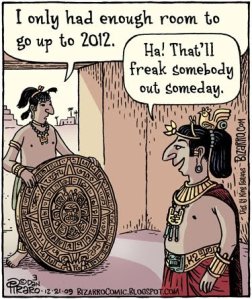 Silly Mayans and your pre-iPhone calendars…
Silly Mayans and your pre-iPhone calendars…
December 21st came and went, and we’re all still here. I, for one, have mixed feelings about it. On the one hand, not sure I want to live in a world without the Twinkie. On the other hand, all that time shopping for Christmas gifts would have been in vain…and that would have really pissed me off. I’d have died a poor (literally and figuratively), miserable, frustrated soul.
Nonetheless, I am still here. And it got me to thinking…what if I did know for sure the world was going to end on December 21st? What crazy marketing ideas might I have tried?Real-world experimentation on a massive scale without personal or professional consequence? Sign. Me. Up! After all, no one’s going to be around to buy my stuff on December 22nd, and my bonus isn’t paid till March, so who cares if it’s a miserable failure…
So, here are three post-(non) apocalypse marketing strategies I came up with.
#1: Turn the website over to the community
There’s a lot of talk about customer-driven marketing. And companies have made progress in this area at varying degrees. But internal pressure to ‘control’ the message limits how far we go in surrendering our story to others.
“Of course the customer’s at the center of my marketing. He’s at the center of what I want him to know about what I sell.”
I’d go all in. Take everything off the website. Leave only three sections.
(1) A massive discussion forum grouped by category with a kick-ass search engine to find what you’re looking for. Any product or company-related information is posted as a discussion, by a real person, feedback is encouraged in an open forum, and nothing is filtered. Everything. Including pricing. The good, the bad, and the ugly.
(2) Tools to help anyone who’s interested in the product buy it. Free trials. Calculators. References. A “buy now” button. Nothing goes here that isn’t helpful to the buyer. Oh, and feedback is encouraged, so if my ‘tool’ sucks, I’ll hear from the community.
(3) A contact us area for people who want to talk to someone.
And all that money I’d save on building and publishing content? I’d use it to hire folks with the editorial expertise to create and man the discussion forums, seed stories, respond to feedback, and pick up the phone (or email, or chat…) when it ‘rings’.
#2: Eliminate all marketing campaigns
At the beginning of the year, I’d set our marketing objectives and, well…that’s about it. No upfront ‘campaign’ planning. No series of sequential touches that takes someone through a buying funnel.
Our customers and prospects would drive how we achieve our objectives. They initiate the dialogue. We respond to the signals they’re sending out in the marketplace, through the communities they participate in, the feedback they provide, and the interactions we observe. We only engage people with explicit permission and with context. Then we cultivate, steer, and seed the conversation toward our objectives. No outbound marketing to anyone who hasn’t previously raised their hand.
#3: Eliminate all paid media
I’d immediately stop spending money on paid media. Branding, demand generation, direct response, all of it. No offline or online advertising, no paid search ads, no purchasing leads, no list rentals, no direct mail…you get the picture. Focus exclusively on earned media (social, PR) and owned media (your own web properties, which if we implement #1 concurrently, are now basically big discussion forums).
Without the ‘crutch’ of paid media holding them up, I’d force marketers to build the brand and drive demand based on the experience, word of mouth, and customer-initiated dialogues.
Reading back on these, they don’t actually sound so off the wall. Maybe I’m not that creative…
Or maybe what I came up with is not that far off from the reality of marketing today. Check out American Express’ OPEN Forum and General Mills’ www.tablespoon.com. They haven’t gone as far as surrendering the entire web experience to customers, but it’s a massive step in that direction. The second idea is nothing more than advocating a real, meaningful conversation with people who want to talk to us. Imagine that… And as to “crazy” idea #3, recall that Google built its business without a dime of paid media. They established their brand through a killer experience and word of mouth, and the customers came in droves.
All of this, just in time for the big rock to hit and wipe us all out. I guess you can’t have it all.
But it might be fun to whisper “I told you so.” with your last breath…
